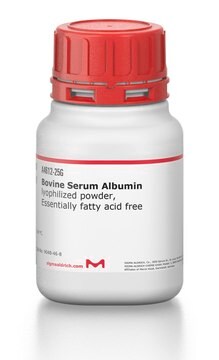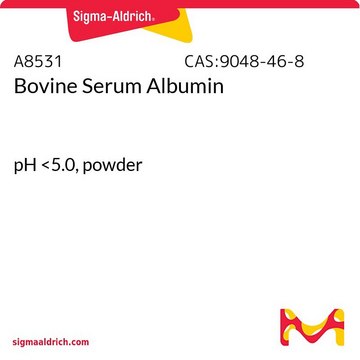A9418
Bovine Serum Albumin
lyophilized powder, BioReagent, suitable for cell culture
Synonym(s):
Albumin bovine serum, BSA, Bovine albumin
About This Item
Recommended Products
biological source
bovine
Quality Level
product line
BioReagent
Assay
≥96% (agarose gel electrophoresis)
form
lyophilized powder
mol wt
~66 kDa
origin
USA origin
technique(s)
cell culture | mammalian: suitable
loss
≤5%
pH
5.0-5.6
solubility
H2O: 40 mg/mL
foreign activity
BT virus, none detected
VSV virus, none detected
shipped in
ambient
storage temp.
2-8°C
Looking for similar products? Visit Product Comparison Guide
General description
Application
Biochem/physiol Actions
Preparation Note
comparable product
Storage Class Code
11 - Combustible Solids
WGK
WGK 3
Flash Point(F)
Not applicable
Flash Point(C)
Not applicable
Personal Protective Equipment
Regulatory Listings
Regulatory Listings are mainly provided for chemical products. Only limited information can be provided here for non-chemical products. No entry means none of the components are listed. It is the user’s obligation to ensure the safe and legal use of the product.
JAN Code
A9418-500G:
A9418-10G:
A9418-50G:
A9418-VAR:
A9418-6X100G:
A9418-BULK:
A9418-5G:
A9418-100G:
Choose from one of the most recent versions:
Already Own This Product?
Find documentation for the products that you have recently purchased in the Document Library.
Customers Also Viewed
Articles
This page segues to comprehensive insights on how serum albumin and other important cell culture components affect the performance of serum-free cell culture systems used for biomanufacturing heterologous proteins including monoclonal antibodies. The page introduces the in vitro chemistry and biochemistry of albumin. These insights may also be applied to ex vivo and tissue engineering applications.
Our team of scientists has experience in all areas of research including Life Science, Material Science, Chemical Synthesis, Chromatography, Analytical and many others.
Contact Technical Service




